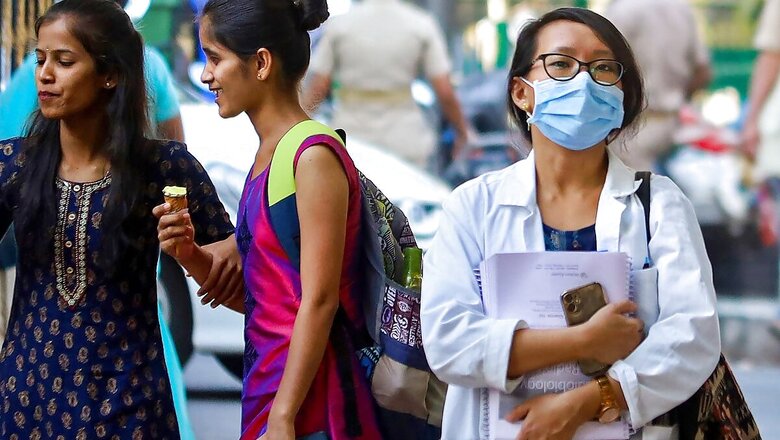
views
The union health ministry on Friday said after registering a spike, cases of the viral fever caused by the H3N2 virus are likely to go down from this month. But experts cautioned that children, senior citizens, pregnant women as well as people with sensitive health issues were among the most vulnerable to contracting seasonal influenza, including the H3N2 virus.
Seasonal influenza is an acute respiratory infection caused by influenza viruses – which circulate in all parts of the world – cases of which increase during certain months globally. Every year, India witnesses two peaks of seasonal influenza: one from January to March and the other in the post-monsoon season.
According to a press release issued by the ministry of health and family welfare, apart from seasonal flu, Karnataka and Haryana have confirmed one death each from the influenza caused by H3N2.
H3N2 is a subtype of Influenza A virus, which is an important cause of human influenza, as per the Centres for Disease Control and Prevention (CDC) and World Health Organization (WHO).
Latest government data points to 3,038 laboratory-confirmed cases of various subtypes of influenza, including H3N2, reported till March 9. These include 1,245 cases in January, 1,307 in February and 486 in March. “The recent rise in cases and associated deaths related to the H3N2 influenza virus is certainly a cause for concern,” said Dr Anup Latne, consultant internal medicine at Surya Mother and Child Super Speciality Hospital in Pune.
Dr Latne said it was particularly alarming for the medical fraternity as some of the earliest symptoms of the virus go undetected as people did not go in for medical consultation for cough, mild to moderate fever, or even sore throat.
Some of the other symptoms include muscle ache, chills, vomiting and nausea. As the virus is contagious, a person’s immunity plays a major role in determining if they are more at risk. “Pregnant women and young children are certainly in the high-risk category. Some of the ways they can take precautions against this virus is by getting adequate rest, increasing fluid intake and diversifying diet to include micronutrients,” Dr Latne said.
Also, experts said when stepping outside, it was important to avoid crowded places such as public transport or shopping malls and, if unavoidable, to wear a mask at all times.
Immunity against the flu reduced in the last three years: Experts
“People who have underlying multiple health-related conditions or weakened immune systems are more susceptible to developing severe symptoms and may take longer to recover from the illness,” said Dr Rajkumar, senior consultant, internal medicine at Indian Spinal Injuries Centre (ISIC).
In the last three years, a majority of people have been affected by Covid-19 variants and its cascading effects can be seen in a compromised immune system along with other problems. “The flu virus changes every year due to antigenic drift and, presently, the circulating predominant virus is H3N2,” Dr Rajkumar said, adding, “this virus is more aggressive because of the fact that in the last three years, people were using masks and following Covid-appropriate behaviour that made them immune to the flu virus as well.”
The usual indolent infections did not occur, reducing immunity against the flu. With reduced mask wearing or none at all coupled with a lack of antibodies against this virus, people are facing its lasting effects.
Another expert, Dr Manisha Arora, senior consultant, internal medicine at Sri Balaji Action Medical Institute, had a similar observation. “A compromised immune system in this way may be the reason and is probably making people more vulnerable towards viral infection,” she said.
The impact of the flu multiplies, especially during the changing season as it can further affect the immune system, thus resulting in infections being more aggressive and prolonged.
“Furthermore, changes in temperature and humidity can also affect survival and transmission of viruses, making them more aggressive,” Dr Arora said. “Pollution can also trigger persistent coughing. Particulate matter, irritating gases and mixed pollutants are all linked to an increase in coughing and wheezing.”
Read all the Latest India News here
















Comments
0 comment